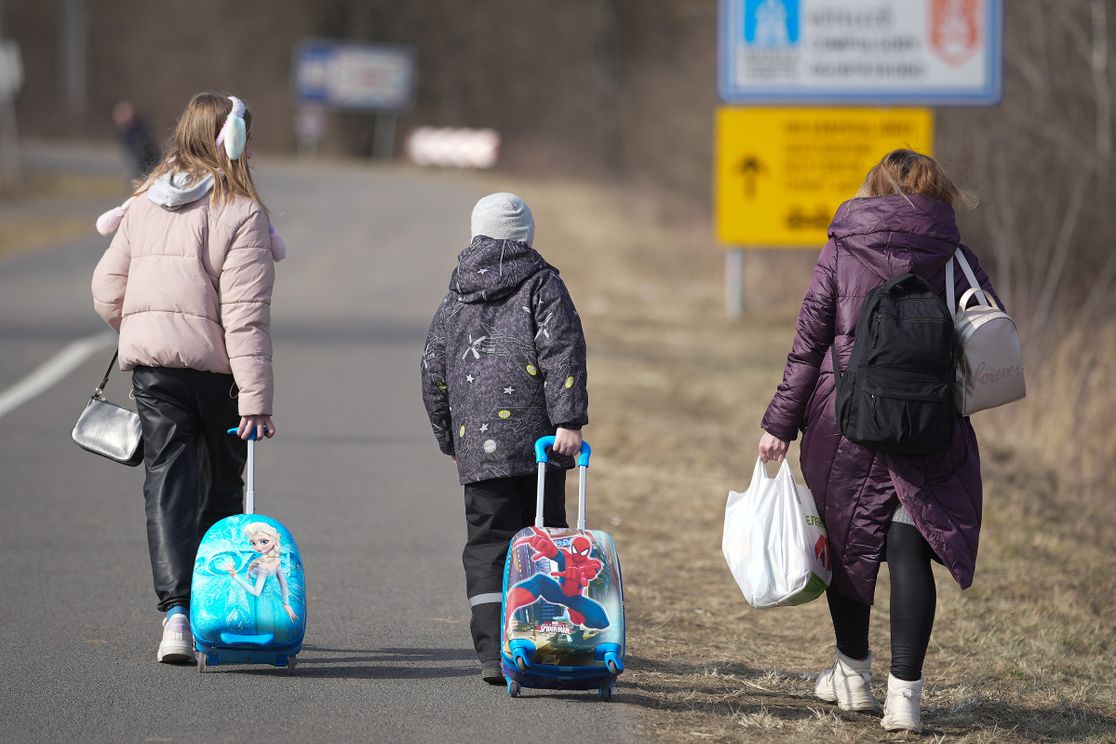| | | | | | | Presented By Facebook | | | | Axios AM | | By Mike Allen ·Mar 04, 2022 | | Hello, Friday. Smart Brevity™ count: 1,351 words ... 5½ mins. Edited by Zachary Basu. 🎧 Launching this weekend ... In a new podcast series, "How it Happened: Putin's Invasion," Axios World editor Dave Lawler tells how the conflict played out in slow motion over eight years — then suddenly escalated. Subscribe here. | | | | | | 1 big thing: Russia seizes reactor | | This image, made from a video released by the Zaporizhzhia nuclear power plant, shows a bright, flaring object landing at the plant in Enerhodar, Ukraine, today. Photo via AP As the Ukraine invasion enters Week 2, Russian shelling ignited a fire at Europe's biggest nuclear plant. That led to global alarm about a meltdown, as the world watched ghostly nighttime video of the complex. - But the fire is out. Russian forces took control of the site.
Why it matters: Ukraine's state nuclear regulator said losing the ability to cool nuclear fuel at the plant could lead to an accident even worse than the 1986 Chernobyl accident — the world's worst nuclear disaster — or the 2011 Fukushima meltdowns in Japan, AP reports. The assault led to a phone call between President Biden and Ukrainian President Volodymyr Zelensky. The U.S. Energy Department activated its nuclear incident response team as a precaution. - Ukraine said no changes in radiation levels have been recorded.
In an emotional speech in the middle of the night, Zelensky accused Russia of "nuclear terrorism" and said he feared an explosion that would be "the end for everyone. The end for Europe. The evacuation of Europe." Photo: Maksim Levin/Reuters This is a drone's-eye view of a residential building destroyed by shelling, in the settlement of Borodyanka, about 35 miles outside Kyiv. Photo: Christopher Furlong/Getty Images A family of Ukrainian refugees in Lonya, Hungary, yesterday after walking across the border. Long queues are forming at border crossings. |     | | | | | | 2. Putin faces danger at home | | Vladimir Putin chairs a Security Council meeting yesterday at his Novo-Ogaryovo residence outside Moscow. Photo: Andrei Gorshkov/Sputnik/Kremlin Pool Photo via AP Thousands of Russians are rushing to flee the country ahead of this weekend, as rumors swirl that Vladimir Putin could soon declare martial law, close the borders and crack down even harder on domestic dissent, Axios' Zachary Basu reports. - Why it matters: For as devastating as the humanitarian situation in Ukraine has become, widespread suffering is rapidly arriving at Russia's own doorstep.
More than 8,000 people have already been detained at anti-war protests since Feb. 24, according to the independent monitor OVD-Info. - Russia's Duma has passed a law making the spread of "fake news" about the Russian military punishable by up to 15 years in prison.
- The last pillars of Russia's already-limited independent press were forced to close under pressure from the Kremlin this week.
- Russia's state communications watchdog blocked the websites of the BBC, Voice of America, Radio Free Europe/Radio Liberty, Deutsche Welle and other foreign media outlets for spreading "fake" information.
👀 What to watch: Russia's second-largest airline announced it will cease all international flights from tomorrow, as Russia's upper house of parliament meets for an emergency session that many fear could mark the descent of a new Iron Curtain. |     | | | | | | 3. Invasion's economic dominoes |  | | | Illustration: Shoshana Gordon/Axios | | | | Ripping Russia, the world's 11th largest economy, out of the global financial system is already causing collateral damage around the world, Axios Markets author Emily Peck writes. - Oil and gas prices have skyrocketed, even though energy was purposefully carved out of sanctions.
- Internal conflicts could erupt elsewhere due to food insecurity.
Catch up quick: Since Russia invaded Ukraine last week, the U.S. and its European allies moved fast to levy some of the harshest sanctions ever imposed. - The strikes were targeted. The West tried to keep the energy sector — a massive part of the Russian economy — out of the most severe penalties, so European countries could continue to buy oil and gas.
Reality check: Russia will start to operate in different ways, carving out an alternate financial system — much like Iran has done after being cut off from SWIFT by the Trump administration. |     | | | | | | A message from Facebook | | Why Facebook supports updated internet regulations | | |  | | | | Paige is one of many experts working on privacy at Facebook — to give you more control over your information. Hear more from Paige on why Facebook supports updating regulations on the internet's most pressing challenges, including federal privacy legislation. | | | | | | 4. Mapped: America's spotty paid sick leave laws |  Data: A Better Balance. Map: Jacque Schrag/Axios President Biden says he wants to revive the emergency COVID sick leave provision that expired at the end of 2020. In the meantime, states have tried to fill the void: 15 states, and dozens of cities, have passed sick-leave laws, Axios' Emily Peck writes. - A new report, released this morning by advocacy group A Better Balance and provided exclusively to Axios, finds that — thanks to these laws — 55 million U.S. workers have guaranteed access to leave.
- 33 million low-wage workers don't have access to paid sick days.
Keep reading. |     | | | | | | 5. Iran nuclear deal near |  | | | Illustration: Annelise Capossela/Axios | | | | An agreement to restore the 2015 Iran nuclear deal could be just days away, with negotiators from Europe and Iran making clear that they've reached the final hurdles, Axios' Barak Ravid and Dave Lawler report. - Rafael Grossi, head of the UN's nuclear watchdog, will travel to Tehran tomorrow to try to resolve one of the remaining disputes — Iran's insistence that an investigation into its undeclared nuclear activity be dropped.
- The success or failure of Grossi's visit could determine the fate of the deal.
All participants in the Vienna talks stress that a deal is very close, but not in hand. - "[W]e are close to a possible deal, but a number of difficult issues remain unsolved," deputy State Department spokeswoman Jalina Porter said in a conference call with reporters.
Zoom out: Iran has dramatically accelerated its nuclear program since President Trump withdrew from the deal in 2018. |     | | | | | | 6. 🧠 Axios explains: Why Ukraine isn't getting a no-fly zone |  | | | Illustration: Sarah Grillo/Axios | | | | Ukraine President Volodymyr Zelensky has repeatedly urged Western leaders to impose a "no-fly zone" over Ukraine. But establishing one appears unlikely any time soon, Axios' Laurin-Whitney Gottbrath writes. - Why it matters: Imposing a no-fly zone (NFZ) would mark a significant escalation in the war — potentially bringing NATO directly into a conventional conflict with a nuclear power.
A no-fly zone is airspace where certain aircraft aren't allowed to enter. - In a war, no-fly zones must be enforced militarily — which can include shooting down banned aircraft.
- The U.S. and other major powers have so far ruled out establishing a NFZ over Ukraine.
- Keep reading.
🇺🇦 New on Axios: Ukraine explainers. |     | | | | | | 7. 🥶 Electric vehicles' winter weakness |  Data: Recurrent. Chart: Baidi Wang/Axios Proud new electric-vehicle owners are being surprised by how much the driving range can be shortened by winter weather, Axios' Joann Muller and Margaret Harding McGill write. - Why it matters: Getting over the hurdles of buying an EV — higher sticker price, finding a charging station, the fear of getting stranded — is hard enough. If cars don't live up to the EPA-estimated range that was promised, it could undermine confidence in EVs and deter buyers.
Case in point: In January, Axios tech reporter Margaret Harding McGill and her husband took their first road trip in their new Mustang Mach-E, from D.C. to a cabin near Wardensville, W.Va. — 110 miles. - The car has an EPA range of 300 miles. But in the chilly weather the estimate before they left home was only about 200 miles, so they had to build in a stop for recharging.
Reality check: AAA found the loss in driving range could be as high as 40% with the heater on full blast. What's happening: Cold temperatures slow down chemical reactions in battery cells, which saps range and increases charging times. - "Batteries are like humans," Anna Stefanopoulou, director of the University of Michigan's Energy Institute, told Wired. "They prefer the same sort of temperature range that people do. Anything below 40 — or above 115 — degrees Fahrenheit, and they're not going to deliver their peak performance."
💡 Pro tip: If you drive with a lead foot, or you like to crank the heat, your range will be lower. - Start the vehicle while it's plugged in to allow the battery to warm up.
Share this story. |     | | | | | | 8. 💰 Priciest U.S. house ever sold at auction | | The 105,000-square-foot mansion has a sky deck and putting green, night club, several swimming pools, a 50-seat theater and a four-lane bowling alley. Photo: Allen J. Schaben/L.A. Times via Getty Images The 21-bedroom, 49-bath mega-mansion dubbed "The One," on a hilltop in the Bel Air area of L.A., yesterday became the costliest U.S. house sold at auction — sold in bankruptcy for $141 million, including $15 million in commission. - The estate has five pools and a 30-car garage, Bloomberg reports. The buyer wasn't disclosed.
Zoom out: The price was far short of the California record set in October by venture capitalist Marc Andreessen, who bought a Malibu estate for $177 million, the L.A. Times reports. - The most ever spent on a U.S. residence was $238 million by hedge fund mogul Ken Griffin for a New York City penthouse in 2019.
|     | | | | | | A message from Facebook | | Why Facebook supports updated internet regulations | | |  | | | | Paige is one of many experts working on privacy at Facebook — to give you more control over your information. Hear more from Paige on why Facebook supports updating regulations on the internet's most pressing challenges, including federal privacy legislation. | | | | 📬 Sign up here for your own personal copy of Axios AM and Axios PM. |  | It's called Smart Brevity®. Over 200 orgs use it — in a tool called Axios HQ — to drive productivity with clearer workplace communications. | | | |















No comments:
Post a Comment